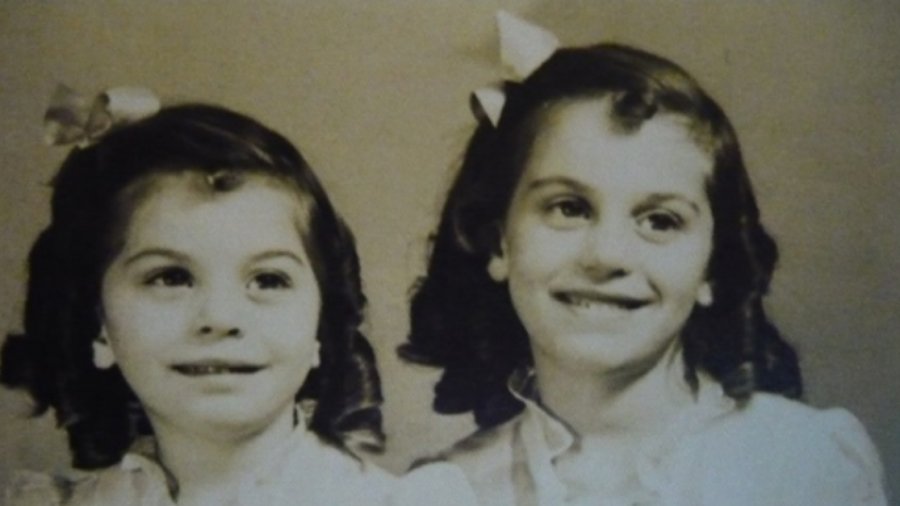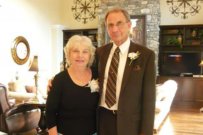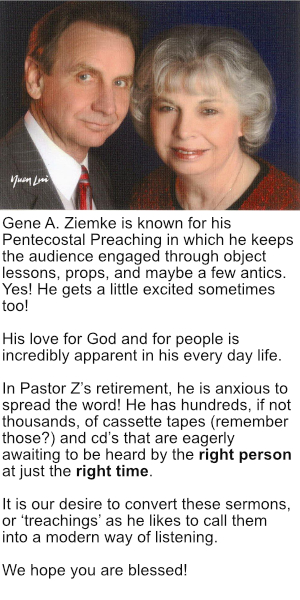Mom wrote their story in 2014 in order to share their history with family and family to come.
I’m excited to now share their story with YOU!
In The Ziemke Story you will learn of their Christian Heritage, their early years, ministry, trying times, family, where they’ve been, and how they ended up where they are today!
We will endeavor to share a little bit of The Ziemke Story each week as Mom wrote it to her children, grandchildren, great grandchildren, and beyond.
Lorraine – The Early Years – 1942-1950
My parents, Lyle Walter Mincer and Bernice Irene Tiller, married on August 6, 1939, just a month after Mom’s 17th birthday. Dad was 25. My sister, Lavonne (Bonnie), was born July 31, 1940.
Lyle farmed along with his father in Iowa for a while, worked in an oil (gas) station as well as a few other odd jobs, and then took training to work on Bomber jets. In the summer of 1941, he, with Bernice, little Lavonne, and another couple, pulled a small travel trailer and moved to California where he got a job in a Bomber plant. The travel trailer became their home. It was in a time of war and just prior to Pearl Harbor, so very often there was a black-out (all lights off). The bomber plant was camouflaged and even had plants growing on the roof. When a plane flew overhead, Bernice shook with fright until the whole little trailer shook. She was pregnant with baby number two (me). The Doctor warned Lyle that if he didn’t move her out of California, she was apt to have a miscarriage. After just a few months in California, they once again packed up and moved back to the Iowa/Nebraska area, arriving in time for Christmas.
Once there, Lyle worked at the Air Base in Bellevue, Nebraska, and they lived in another travel trailer. As time came close for me (baby Lorraine) to be born, Bernice went to stay with her parents in Spencer, Iowa. Her mother, Mable Tiller, ran a sort of old folks home with just a few residents. There was plenty of room for Bernice and little Lavonne, and a good place for the Doctor to come for the delivery. Mable was known for helping Doctors during delivery and even stayed in homes with new Mom’s for a week or two after the births.
Lyle was due to make the trip from Bellevue to Spencer that weekend, but the baby arrived a few hours before he made it there. Grandma Tiller met him at the door with, “Come and see what we have for you!” I (Lorraine) was born on February 21, 1942, the second daughter of 27 year old Lyle and his 19½ year old wife. It would be the last “home delivery” the Doctor would make. Now he would only deliver babies in the hospital.
One day when I was crying, little Lavonne, now 18 months, climbed up on the crib and said, “Don’t cry baby Rainie doll”. That changed my name forever within the family. My Mom called me “Baby Rainie Doll” to her dying day.
When the war was over, Lyle went back to farming in Spencer. On some of the early farms, Bernice’s responsibility was to take care of the chickens. She usually bundled us little girls up and took us out with her to feed the chickens and gather eggs. It was a cold day and she thought that maybe this one time she could leave us in the house for a few minutes. As she stepped out the door, she changed her mind and came back to get us. Just then, she saw that the hot chimney had started burning the adjoining wallpaper. Things would have turned out so different had she not had that mother’s intuition.
After Grandma and Grandpa Tiller moved to Bellevue, Nebraska, Grandpa sometimes came back on the train or bus to spend a few days with us on the farm. When Lavonne and I were yet toddlers, he sat in the big wooden rocker and held us both at the same time. One day as we were bouncing on his knees he said: “All aboard, this train’s going to Chicago, etc. etc.” Bonnie, with her vivid imagination was going right along with it and repeated his words, while I, the realist, said in my low alto voice, “Grandpa, this train’s going no-where; this train’s staying right here”. He and my Mom laughed about that and repeated the story for years to come.
From time to time, Lyle farmed either with his father, rented land, or farmed 50/50 with a land owner. The latter was the situation on the Johnson farm, just out of Spencer, where we lived for two or three years, until I was eight years old. Richard was born in 1947 when I was five.
The school Bonnie and I attended from first through third grade (fifth for her) was a one-room schoolhouse where all eight grades were together. It was Riverton Township # 5. The teacher, Mrs. Miller, gave us assignments to study on our own and then called one class at a time to the front for individual instruction.
There was a chalkboard and pull down map at the front. She had a contraption of sorts that held five pieces of chalk which allowed her to make even chalk lines on the board. It was used for music treble and bass clefs and for demonstrating cursive writing. We had oral spelling tests and learned recitations for Christmas programs.
If weather was inclement, we might spend our recess indoors playing Old Maid, Drop the Handkerchief, or Bingo. Outdoor games included Simon Says, Red Rover, Hop Scotch, and London Bridge. Of course, jump rope was popular both indoors and out. When recess was over, someone, by turns, had the privilege of ringing the big brass hand bell.
There was a stool in the corner and a “dunce cap” for anyone who misbehaved. It was a threat but not often used.
We brought our own lunches from home but in the winter Mrs. Miller also warmed up a canned vegetable (usually corn) to have along with it. I was sometimes privileged to be the helper in making mimeographed copies of worksheets. To mimeograph, she drew on a special paper that collected thick ink on the back. That sheet was then put on the tray of mimeograph gel so the ink would soak into it. It was then ready to lay one sheet of paper at a time on the gel tray and press it down with a weighted roller until the sheet was inked. It was time consuming but effective. Mrs. Miller had a lot of construction paper for art projects. She always found a “sky-blue-pink” sheet in the assortment of colors and commented on it.
Lavonne (now nicknamed Bonnie), with a vivid imagination, sometimes tried to scare me with some of those imaginings. We noticed some little ant holes with small piles of sand surrounding them while walking down the road by our house. She told me that in the middle of the night, she made herself really small to go down those holes and visit the ants. We cut out animal Halloween masks from the back of cereal boxes and hung them like pictures on our bedroom walls. She told me that in the night those scary animals came alive. And, worst of all, she once straddled me on our bed and told me she hated me and that I was adopted. Each of those times I went crying to Mom for consolation. I’m sure Bonnie really loved me and had my best interest at heart…most of the time.
We had hired hands from time to time on the Johnson farm. Horace (nicknamed Hod) was a smoker. Bonnie and I liked to help him sprinkle lime in the freshly cleaned barn, clean the separator, and even tromp around in the silo. I was with him in the almost empty silo, loosening up the silage left on the bottom when he made a remark that he might have to “fire” me. The only thing I could think of was that he would burn me with his cigarette. So again, off I went crying to Mom.
There were fun things to do on that farm. One of which was to play in the hay loft of the barn when most of the hay had been used and it was fairly empty. In fact, we could roller skate on the nice smooth boards. One day though, someone had left the trap door open where hay could be thrown down to the animals below and Bonnie skated right through it. She fell into the bull pen. It’s a good thing it was a soft landing on the hay and she wasn’t terribly injured. Even with her skates on, she made it up and over the high fence to escape the bull’s wrath. Shaking and all out of breath, we ran into the house to tell Mom what had just happened.
We had a little white dog named Cleo and a brown horse named Daisy. There was another horse I loved to ride, it was a palomino (Golden-tan) Stallion. I don’t think we had it very long but it was so special. It had been trained to stretch its front legs forward and back legs back to lower himself to the ground for easier mounting. I could gallop that horse so smoothly.
Mom sometimes rode the brown horse, usually on the road close to home and sometimes just out one driveway and in the other. The driveway came in by our house, circled around and exited just past the hired hands house. She came galloping down the road and decided to bypass the first drive but the horse turned in anyway and she kept going, landing in the ditch.
Dad thought we weren’t riding the horses enough and decided he would sell Daisy without telling us. A man came to buy her and actually had her loaded in his trailer when we realized what was going on. Lavonne and I, and our cousin Marlys, who happened to be visiting, started to cry. We were out by the trailer sobbing and didn’t let up until Dad told the man, “I guess we have to keep her after all”. That was so sweet of him. Though disappointed, the man understood.
Family entertainment might have included a Sunday afternoon drive in the countryside, or an evening jaunt to the Jersey Dairy in Spencer for an ice cream cone. There was an occasional concert in town and we attended the Blackwood Brothers’ quartet once or twice. Dad brought home some country music 45 RPM records with Roy Rogers’ “Get Along Little Dogies”, Gene Autry’s” Home on the Range”, Sons of the Pioneers’ “Cool Water”, and others. We learned several of the songs.
When the Sears catalog came, it was fun to peruse through it and say what you would buy for a friend or relative from each page.
The Farmhouse at Spencer
There was a big country kitchen in the Johnson farmhouse. As a carryover from the days of poor refrigeration, a cabinet door near the floor housed a small dumbwaiter to lower items that should be kept cold down into the ground. We didn’t use it much for that since we had a refrigerator but it was always a curiosity. There was a large dining room and, beyond that through a big open square-framed doorway, the living room. From there, one could open French doors to the front entry hall, a room large enough for the piano and stairs to the second floor. That room wasn’t heated much in the winter and the front entry not often used. A door led from there back into the kitchen; so, yes, this was one of those houses where you could run around in a circle.
There were four bedrooms upstairs. Mom and Dad’s room, our room (Bonnie and I), baby Richie’s room, a guest room, and the bathroom. Mom was as creative as she could be within a budget. Since the linoleum on the bathroom floor was much worn, she painted it one solid color – blue or black and then stippled other colors on with a toothbrush dipped in paint.
Mom did a lot of sewing. Besides her work on the farm and taking care of us children, she always felt like she should have some sewing project going on. She made Bonnie and I several matching outfits. Usually it was red for Rainie and blue for Bonnie. Our play clothes were made from cotton chicken feed sack fabric, much like calico or geometric prints of today. She even made some peddle pushers (now known as Capris) for herself and the older cousins who came to visit.
One Christmas, Mom made Bonnie and me big rag dolls. They were almost as tall as me and had yellow yarn braids. The faces were embroidered on. She worked on them after we went to bed and otherwise hid them in one of the large built-in drawers in the dining room. We were so excited to get them that Christmas. I named mine Marcella.
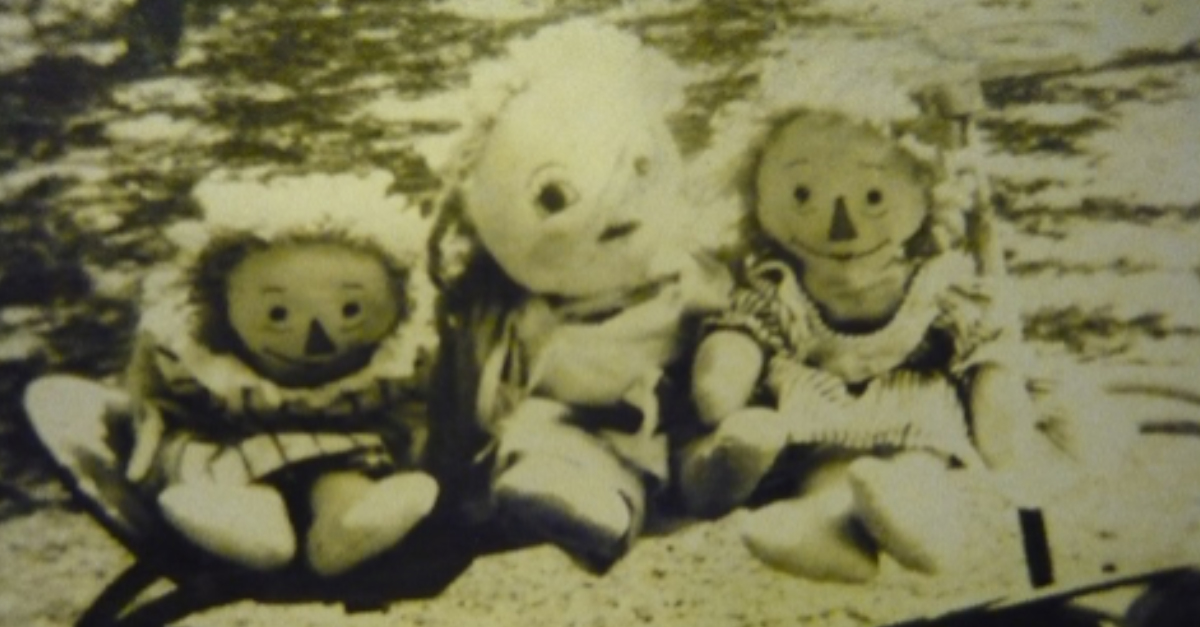
Raggedy Ann and Andy with Marcella
Farmers from the area helped each other at harvest time. Mom cooked for them when they worked on our farm, spreading the dining room table out big enough for all. She used her good china too. Once in a while I’d hear her say, “I couldn’t have done it without you, Rainie (or Bonnie)”. That made us feel important.
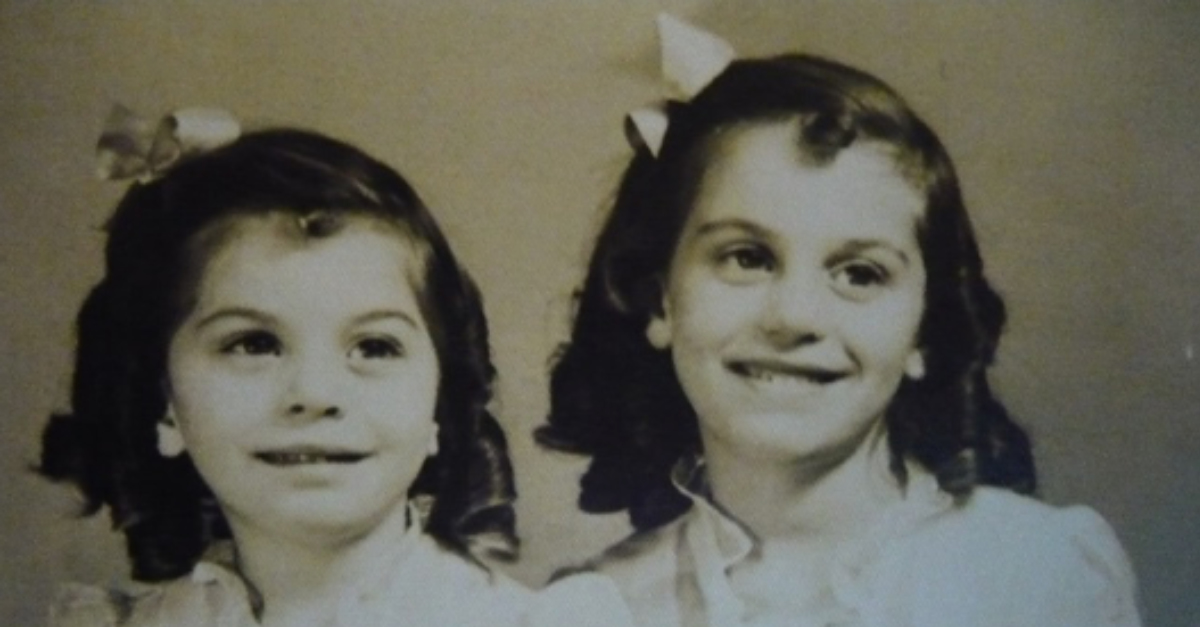
Periodically a milk inspector came by and spent quite a bit of time going over records with Dad at the dining room table. We invited him to dinner and to spend the night before going on to the next farm.
One of the farm homes we lived in had a large basement. Mom was again in charge of the chickens and eggs. We cleaned the eggs at the sink in the basement and packed them for market in large cardboard boxes on square crate stackers. She made us feel like we were good helpers. We probably helped some, though I’m sure she just wanted us close by so she could get her work done without worrying where we might be.
When chickens were ready to butcher, she took care of that too. Dad might have chopped off the heads but she was fully capable and did it sometimes herself. Once again in the basement, the chickens were dipped in a large pot of hot water on the stove to loosen the feathers. Then the feathers were plucked and the chickens gutted. I hated that smell more than anything. We girls helped pull out the pin-feathers (the small ones left behind).
Mom began having chest pains. She would lay across her bed for a few minutes rest and then get up and start working again. Finally, Dad took her to the Doctor who said she was just overworked. He instructed Dad to take her on a vacation. Our older cousins, Nitavonne and Delores (Uncle Jerry’s daughters), came to stay with us while they were away a few days. Mom was just 27.
We always had an old upright piano. When Mom finished one project, she would often sit down at the piano, just to play a song or two before going on to the next task.
We lived in the country out of Spencer, Iowa, until I was eight years old and attended the First United Pentecostal Church where Rev George Dainty was the Pastor. This was the church Mom and Dad had met in when they were young. The Pastor and his wife lived in the apartment behind the platform of the church. Their daughter, Virginia, had married Mom’s brother, Kirby, probably 11 or 12 years prior to my birth. So there was a sort of family connection there.
Brother Dainty preached like the old time preachers until he was red in the face and foamy saliva developed at the corners of his mouth. He kept a big white hanky handy to wipe it from time to time. They were precious people who, when my Mother was a child, had picked up the Tillers for church before they had a car. Mom said she always wanted to pay them for doing that. Later in life, at a celebration of their ministry, she told that story and gave them $100.
Bonnie decided she wanted to be baptized. I thought about it and decided I would be baptized at the same time. We were eight and ten. The baptistery was under the platform and the water was very cold. A trap door was pulled up to reveal it. Pastor Dainty had to get in it as well with his white shirt and pants and waist high boots. Bonnie was wearing a blue striped dress and mine was identical but pink. She was baptized first and then it was my turn. I was shaking and my knees literally knocking from just the prospect of getting baptized and then that cold water. Brrr! But the baptism took, of course. I knew what I was doing in giving my heart to God and have never looked back.
We sang from the Pentecostal song books every service. I can still remember those songs today, though they haven’t been sung for many years. “There Shall be Showers of Blessings”, “Sunlight, Sunlight”, “Count Your Blessings”, and many many more. The Lord touched me in those services, sitting by my Mom and singing…sometimes shedding a few tears as I felt God’s presence.
Dad was anxious to get a farm of his own and began looking around. He came back from a trip to Carson, Iowa, (175 miles south of Spencer) and told Mom about an opportunity there. It was a 160 acre farm with an old barn and farm house with no indoor bathroom. The price was $32,000. The bank would loan him the money at 4% interest. He wondered if he was too old, at age 35, to make such a move.

